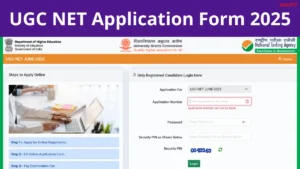Table of Contents
JRF Full Form is Junior Research Fellowship, a major scholarship given to candidates pursuing advanced research in a PhD program. It is offered by organizations like the University Grants Commission (UGC) through the National Eligibility Test (NET) and the Council of Scientific and Industrial Research (CSIR). The JRF provides financial support to researchers, allowing them to focus on their studies without worrying about money. JRF recipients receive a monthly stipend and other benefits, encouraging them to make contributions to research and development in their fields.
JRF Full Form
JRF Full Form is Junior Research Fellowship, a prestigious opportunity for postgraduate students to pursue research in various fields. It helps talented candidates continue advanced studies and research, usually leading to a Ph.D. Universities, colleges, and research institutes offer JRF positions to promote research and nurture the next generation of scholars.
JRF Full Form in Hindi
JRF का पूरा नाम जूनियर रिसर्च फेलोशिप है। यह एक महत्वपूर्ण अवसर है, जो पोस्टग्रेजुएट छात्रों को शोध करने के लिए दिया जाता है। यह फेलोशिप छात्रों को उच्च शिक्षा में सहायता करती है, विशेष रूप से पीएचडी कार्यक्रमों के लिए। जूनियर रिसर्च फेलोशिप (JRF) उन छात्रों के लिए एक प्रतिष्ठित कार्यक्रम है जो अपने शोध कौशल को विकसित करना चाहते हैं। इस फेलोशिप के अंतर्गत, चयनित छात्रों को मासिक वजीफा दिया जाता है, जिससे वे अपने शोध पर ध्यान केंद्रित कर सकते हैं। JRF का मुख्य उद्देश्य नए शोधकर्ताओं को प्रोत्साहित करना और उच्च शिक्षा में अनुसंधान के स्तर को बढ़ाना है।
What is JRF?
Junior Research Fellowship (JRF) is a fellowship program designed to support postgraduate students in pursuing advanced research, typically leading to a Ph.D. It provides financial assistance through a monthly stipend, allowing scholars to focus on their research without financial worries. Various organizations, including UGC and CSIR, offer JRFs to promote academic and scientific research. JRF holders often work in universities, colleges, or research institutes, contributing to innovation and knowledge development in their respective fields.
JRF Eligibility Criteria
To be eligible for the Junior Research Fellowship (JRF), candidates must meet certain educational and age-related requirements:
- Educational Qualification: Must have a postgraduate degree (Master’s) in relevant subjects with a minimum of 55% marks (50% for reserved categories). Final-year students awaiting results can also apply, provided they complete their degree within the specified timeline. For some fellowships, additional qualifications like clearing UGC-NET or CSIR-NET are mandatory.
- Age Limit: The general upper age limit is 30 years. Relaxation of up to 5 years is available for reserved categories, women, and candidates with research experience.
- Nationality: Candidates must be Indian citizens, though certain international fellowships may have separate eligibility criteria.
JRF Application Process
Applying for a Junior Research Fellowship involves several steps, including submitting academic details and a research proposal. Applicants need to explain their research plan, covering its goals, methods, and expected results. The selection process is competitive, with experts reviewing each application for its quality, relevance, and impact. Selected candidates receive the fellowship, which includes a stipend and, in some cases, extra funds for research expenses.
- Prepare Documents: Gather academic records and any required certificates.
- Draft Research Proposal: Create a detailed research proposal outlining your research goals, methods, and expected outcomes.
- Submit Application: Complete the application form, including your academic details and research proposal.
- Review Applications: Expert panels will evaluate each application based on quality, relevance, and potential impact.
- Selection Announcement: Successful candidates will be notified about their selection for the fellowship.
- Receive Fellowship: Awarded candidates will receive a stipend and, in some cases, additional funding for research expenses.
JRF Certificate Validity
The JRF certificate issued through UGC NET is valid for 3 years from the date of issuance. During this period, candidates must secure admission to a PhD program to utilize the fellowship benefits. If they fail to enroll within the stipulated time, the JRF eligibility will expire. However, once enrolled, the fellowship can be extended up to a total of five years, including the Senior Research Fellowship (SRF) tenure, based on satisfactory research progress.
Junior Research Fellowship Stipend
Understanding the financial challenges associated with higher education and research, the JRF program provides a monthly stipend of Rs. 37,000 to the awardees for the first two years. Upon successful completion of two years, based on the progress and contribution to their research, fellows can be promoted to Senior Research Fellows (SRF), receiving an enhanced stipend i.e. Rs. 42,000 for the subsequent tenure of their fellowship. The Junior Research Fellowship (JRF) program in India provides financial assistance to students pursuing doctoral (Ph.D.) degrees in various disciplines.
JRF Revised Stipend
The primary component of JRF financial support is the monthly stipend. As of March 2024, the UGC (University Grants Commission) mandates a minimum stipend of Rs. 37,000 per month for the first two years of the fellowship. This amount increases to Rs. 42,000 per month in the third year.
| Designation | Duration | Stipend |
|---|---|---|
| Junior Research Fellow (JRF) | 2 Years | Rs. 37,000/- |
| Senior Research Fellow (SRF) | 3 Years | Rs. 42,000/- |
JRF Allowances
- JRF awardees may be eligible for additional allowances depending on the funding agency and the university/institution.
- House Rent Allowance (HRA) is a common allowance, particularly for JRF scholars residing outside university hostels.
- The quantum of HRA varies depending on the city/location and is usually a percentage of the stipend amount.
- Some funding agencies might offer annual contingent grants to JRF fellows. These grants can be used for research-related expenses like conference participation, books, or lab consumables.
JRF Tenure
The Junior Research Fellowship (JRF) awarded through UGC NET is initially valid for two years. After evaluating the fellow’s research progress, the tenure may be extended for three more years under the Senior Research Fellowship (SRF), totaling a maximum of five years. Continuation depends on satisfactory performance, reviewed periodically by the respective institution or research supervisor.
What to do after JRF?
Candidates of the JRF have the opportunity to pursue Ph.D. programs at top Indian universities and colleges, setting off on a journey that fosters academic advancement and professional development. This fellowship serves as a crucial foundation for scholars, enabling them to engage in rigorous research that contributes to the knowledge economy and addresses significant challenges through their work.
- Pursue a Ph.D.: Continue studies focused on your research interests.
- Engage in Research Projects: Participate in ongoing research to build experience.
- Publish Research Findings: Submit papers to academic journals and present at conferences.
- Apply for Higher Fellowships: Seek advanced fellowships or postdoctoral positions.
- Teach or Mentor: Take up teaching roles and guide junior researchers.
- Explore Industry Roles: Apply your skills in relevant industries.
- Network: Attend conferences and workshops to build professional connections.
- Stay Updated: Keep learning through journals, courses, and seminars.
Benefits of Junior Research Fellowship (JRF)
- Financially secure your Ph.D. journey.
- Unlock prestigious Ph.D. programs.
- Gain hands-on research experience under experts.
- Become qualified for research & teaching careers.
- Sharpen your mind and research skillset.
- Build a network of valuable connections.
- Contribute to groundbreaking research in your field.
What is NET Junior Research Fellowship?
The NET Junior Research Fellowship (NET JRF) is a fellowship awarded through the National Eligibility Test (NET), which is conducted by the University Grants Commission (UGC) in India. Candidates who obtain the NET JRF are eligible to enroll in Ph.D. programs and engage in research activities. This fellowship is exclusively available to those who pass the NET examination.
JRF Exam Pattern
The examination pattern for JRF includes the following features:
- Two-Part Examination:
- Paper I: General studies testing, including logical reasoning, data interpretation, and general awareness.
- Paper II: Subject-specific questions based on the candidate’s chosen area of study.
Offline Mode: The examination is typically conducted in offline (pen-and-paper) format.
Positive and Negative Marking: Points are awarded for correct answers, while marks are deducted for incorrect responses.
Junior Research Fellowship Selection Process
The selection process for the Junior Research Fellowship (JRF) consists of several important steps:
- Eligibility Check: Candidates must verify that they meet the eligibility criteria set forth by the examining authority, including educational qualifications and age limits.
- Examination: Candidates are required to take and pass the National Eligibility Test (NET), which evaluates their knowledge in specific subjects along with general aptitude.
- Scoring and Ranking: After the JRF Exam, candidates are scored based on their performance, and rankings are assigned according to their scores.
- Fellowship Allocation: The JRF is awarded to the highest-ranking candidates, allowing them to pursue research opportunities in their chosen fields.
Advantages of JRF over NET
Securing JRF through UGC NET provides several benefits beyond the regular NET qualification. JRF qualified earn a monthly stipend and financial support for research projects. Additionally, JRF candidates will get advantages when applying for PhD programs and research positions, as many universities prioritize them over NET-only qualifiers. The JRF fellowship also enhances career prospects by offering hands-on research experience and eligibility for higher positions, such as postdoctoral fellowships and research scientist roles.




 KVS Recruitment 2025 Out For TGT, PGT, P...
KVS Recruitment 2025 Out For TGT, PGT, P...
 MH SET Exam Center List 2025, District W...
MH SET Exam Center List 2025, District W...
 UGC NET Application Form 2025 Starts for...
UGC NET Application Form 2025 Starts for...














